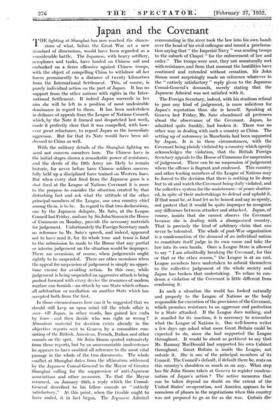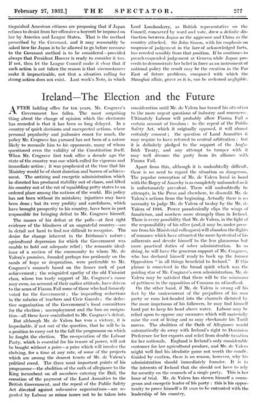Japan and the Covenant
r 1111E fighting at Shanghai has now reached the dimen-.
sions of what, before the Great War set a new standard of dimensions, would have been regarded as a considerable battle. The Japanese, with heavy artillery, aeroplanes and tanks, have landed on Chinese soil and embarked on a fierce offensive against Chinese troops, with the object of compelling China to withdraw all her forces permanently to a distance of twenty kilometres from the International Settlement. This, of course, is purely individual action on the part of Japan. It has no support from the other nations with rights in the Inter- national Settlement. If indeed Japan succeeds in her aim she will be left in a position of most undesirable dominance in regard to them. It has been undertaken in defiance of appeals from the League of Nations Council, which, by the Note it framed and despatched last week, made it perfectly clear that it was compelled, with how- ever great reluctance, to regard Japan as the immediate. aggressor. But for that its Note would have been ad- dressed to China as well.
With the. military details of the Shanghai fighting we need not concern ourselves here. The Chinese have in the initial stages shown a remarkable power of resistance, and the deeds of the 19th Army are likely to remain historic, for never before have Chinese soldiers success: billy held up a disciplined force trained on Western lines. But when every shot fired from the Japanese guns is a, shot fired at, the League of Nations Covenant it is more to the purpose to consider the situation created by that disturbing fact and ask what the attitude of the other principal members of the League, our own country chief among them, is to be. In regard to that two declarations, one by the Japanese delegate, Mr. Sato, at the League Council last Friday, and one by SirJohn Simon in the House of Commons on Monday, provide the necessary materials for judgement. Unfortunately the Foreign Secretary made no reference to Mr. Sato's speech, and indeed, appeared not to have read it, for its whole tone and tenor is fatal to the submission he made to the House that any partial or interim judgement on the situation would be improper. There are occasions, of course, when judgements ought. rightly to be suspended. There are other occasions when the appeal for suspension of judgement is simply an oppor-, tune excuse for avoiding action. In this case, while judgement is being suspended an aggressive attack is being pushed forward with every device the resources of modern warfare can furnish—an attack by one State which refuses all arbitration or mediation on another State which has accepted both from the first.
In those circumstances how can it be suggested that we should still keep an open mind till the whole affair is aver—till Japan, in other words, has gained her ends by force--and then decide who was right or wrong ? Abundant material for decision exists already in the objective reports sent to Geneva by a committee con- sisting of the British, American, French, Italian and other consuls on the spot. Sir John Simon quoted extensively from those reports, but by an unaccountable inadvertence he appears to have omitted all reference to the most vital passage in the whole of the two documents. The whole conflict at Shanghai dates from the ultimatum addressed by the Japanese Consul-General to the Mayor of Greater Shanghai calling for the suppression of anti-Japanese associations and other measures. To that the Mayor returned, on January 28th, a reply which the Consul, General described to his fellow consuls as " entirely satisfactory." At this point, when• the trouble ought to have ended, it in fact began. The Japanese Admiral commanding in the river took the law into his,own hands over the head of his civil colleague and issued a proclama- tion saying tlmt " the Imperial Navy " was sending troops to the suburb of Chapei " for the enforcement of law and order." The troops were sent, they not unnaturally met with resistance, and from that moment the hostilities have continued and extended without cessation. Sir John Simon most surprisingly made no reference whatever to the " entirely satisfactory " reply given to the Japanese Consul-General's demands, merely stating that the Japanese Admiral was not satisfied with it.
The Foreign Secretary, indeed, with his studious refusal to pass any kind of judgement, is more solicitous for Japan's reputation than she is herself. Speaking at Geneva last Friday, Mr. Sato abandoned all pretences about the observance of the Covenant. Japan, he admitted quite frankly, had broken it. There was no other way in dealing, with such a country as China. The setting up of autonomy in Manchuria had been supported by Japan. It is in these circumstances, : With the Covenant being plainly violated by a country Which openly acknowledges the yiolation, that the British Foreign Secretary appeals to the House of Commons for suspension of judgement. There can be no suspension of judgement, where the offence is flagrant and confessed. This country and other leading members of the League of Nations may be forced to the decision that there is nothing to be done but to sit and watch the Covenant being daily violated, and the collective system for the maintenance of peace shatter- ed, in spite of their undertakings to defend and .uphold it.. If that must be, at least let us be honest and say so openly, not protest that it would be quite improper to recognize: any difference between attacker and attacked. Japan, of course, insists that she cannot observe the Covenant because she is dealing with a disorganized country. That is precisely the kind of arbitrary claim that can never be tolerated. The whole of post-War organization is a condemnation of the demand of an individual nation to constitute itself judge in its own cause and take the law into its own hands. Once a League State is allowed to say " I am admittedly breaking the Covenant, for thii or that or the other reason," the League is at an end; League members have undertaken to submit themselves to the collective judgement of the whole society and Japan has broken that undertaking. To refuse to con-. demn a violation of the Covenant is little different from condoning it.
In such a situation the world has looked naturally and properly to the League of Nations as the body responsible for execution of the provisions of the Covenant, which promises resistance to an aggressor and protection. to a State attacked, If the League does nothing, and is assailed for its inaction, it is necessary to remember what the League of Nations is. One well-known writer a few days ago asked what more Great Britain could be expected to do, since she had supported the League throughout. It would be about as pertinent to say that Mr. Ramsay MacDonald had supported his own Cabinet throughout. Great Britain is inside the League, not outside it. She is one of the principal members of- its Council. The Council's default, if default there be, rests on this country's shoulders as much as on any.. What step. has Sir John Simon taken at Geneva to register condem-, nation of Japan's action ? The active measures that can be taken depend • no doubt on the extent of . the United States' co-operation, and America appears to be conscious of phases in the negotiations when-this. country. was not prepared to go as far as she was. Certain dis- tinguished American citizens are proposing that if Japan refuses to desist from her offensive a boycott be imposed on her by America and League States. That is the method prescribed by the Covenant, and it may reasonably be asked how far Japan is to be allowed to go before recourse to the Covenant method is to be considered—provided always that President Hoover is ready to consider it too. If not, then let the League Council make it clear that if such action is not taken the reason is that circumstances make it impracticable, not that a situation calling for strong action does not exist. Last week's Note, in which
Lord Londonderry, as British representative on the Council; concurred by word and vote, drew a definite dis- tinction between Japan as the aggressor and China as the country attacked. Sir John Simon, with his emphasis on suspense of judgement in the face of acknowledged facts, has receded sensibly from that position. If he continues to preach suspended judgement at Geneva while Japan pro- ceeds to demonstrate her belief in force as an instrument of national policy the result may be the creation in the Far East of future problems, compared with which the Shanghai affair, grave as it is, can be reckoned negligible.



































 Previous page
Previous page